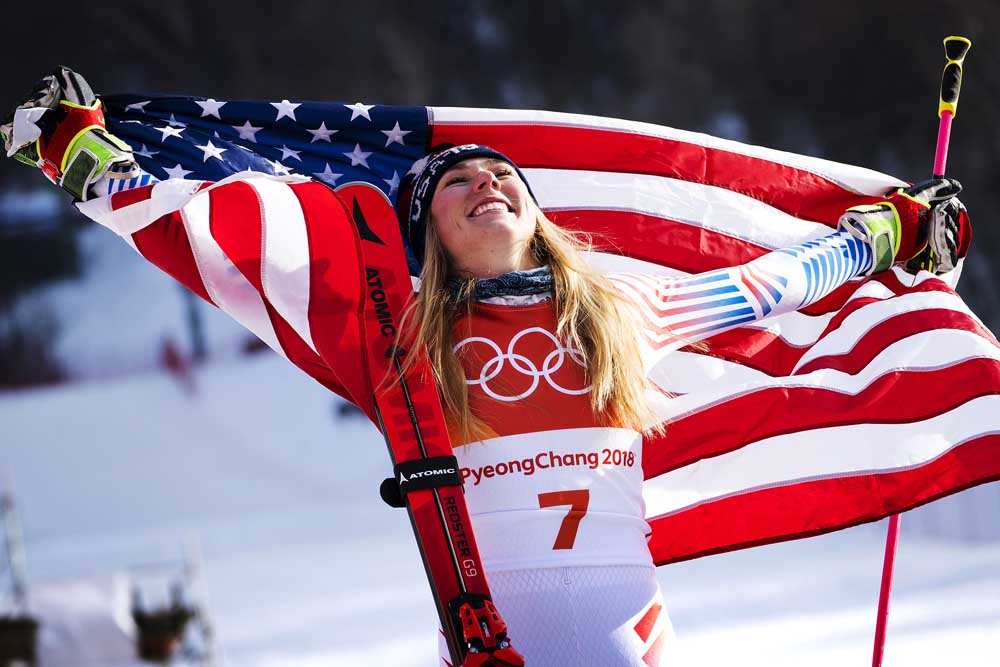Shiffrin embraces next stage, with tennis star as a guide
Published 12:00 am Saturday, November 24, 2018

- Mikaela Shiffrin of the U.S. after winning the gold medal at the Yongpyong Alpine Center in Pyeongchang, South Korea, on Feb. 15. Shiffrin, 23, has a gaggle of sponsors and a brand to cultivate, public appearances and media obligations, and a throng of up-and-comers nipping at her heels. (Doug Mills/The New York Times)
KILLINGTON, Vt. — Mikaela Shiffrin made her debut on the professional World Cup ski racing tour in 2011 when she was 15. Two years later, she was the first American to win two World Cup races before she was 18. A year after that, she was the youngest Olympic slalom champion in history.
Times have changed.
Before a recent race, Shiffrin was looking at the list of competitors when she realized — gasp! — she was older than nearly half the field.
“I’ve been used to being the baby,” said Shiffrin, 23. “But now I hear the birth year of some girls and I swear it sounds like ‘2017,’ and I’m like, ‘Wait, what?’”
A teenage phenomenon no longer, Shiffrin is an adult with all the trappings of the modern pro athlete: a gaggle of sponsors and a brand to cultivate, public appearances and media obligations, and yes, an ambitious throng of up-and-comers nipping at the heels of perhaps the most precocious talent in her sport’s history. It is no wonder she spent part of her offseason shadowing Roger Federer.
“I’ve been thinking: Oh, man, this is what it felt like for everybody else when I was coming up the ranks,” Shiffrin said as she sat in a Colorado condo after a training session this month.
But Shiffrin, a three-time Olympic medalist and the two-time defending women’s World Cup overall champion, is not overly vexed by her veteran status.
“Everybody goes through it — time keeps moving on,” she said. “We get older and hopefully more mature.”
Moreover, when asked if she felt her career was entering a new stage, she answered without the slightest hesitation: “I feel like I’m constantly entering a different stage.”
That may be the most apt description of Shiffrin’s incandescent career.
Shiffrin’s charge through the ski-racing record books — she is on a pace to shatter a host of World Cup and Olympic records — could continue this weekend with two World Cup races at the Killington ski resort in Vermont. Shiffrin has become the pied piper and the main attraction of the event, which returned to Vermont for the first time in nearly 40 years in 2016.
Since then, the Killington races have drawn some of the biggest crowds on the women’s circuit, a tour primarily based in Europe.
Shiffrin has continued to represent the new guard of ski racing in the United States, especially with Lindsey Vonn retiring after this season. Vonn injured a knee in training Monday, which will delay her debut on this year’s World Cup circuit.
Shiffrin is careful not to be seen as nudging Vonn out of the way when Vonn is only four victories from tying the record for most career World Cup wins (86), set in 1989 by Ingemar Stenmark of Sweden.
Maybe the best way to depict what is different with Shiffrin now is to consider how she spent her offseason. She used to look forward to several weeks of summer at her parents’ Colorado home, where she would catch up on unviewed episodes of favorite television shows, like “Madam Secretary” or “Blue Bloods.”
This year, Shiffrin went on a Caribbean vacation with her boyfriend, French ski racer Mathieu Faivre; was a presenter at the ESPY Awards; attended a festival in Cannes; and, providently, came in regular contact with Federer, who, like Shiffrin, is sponsored by pasta maker Barilla.
At functions with Federer, Shiffrin found herself diligently studying how the tennis star behaved and interacted with the public.
“He was engaged with every person he was talking to — it wasn’t like he was just looking at his phone and not them,” she said. “I don’t even think he had his phone with him. I watched how he conducted himself around people in general or with the media. It was eye-opening to see how fully he gave of himself.
“It was an important thing for me to learn at this point in my career.”
Comportment is increasingly imperative to Shiffrin because her many accomplishments have led to a plethora of valuable partnerships with corporate sponsors, who expect certain standards, and not just those achieved on a ski slope.
“I often think of myself as a literal investment,” she said. “It sounds serious, like kind of dehumanizing, but I’m conscious of the brand. I think there are some athletes who don’t think about that enough.
“I’m a human and a person, and a ski racer. But I have sponsors who invest in me hoping that I’m going to stay the course and have success. I feel like you don’t want to skirt around that.”
To that end, despite her new offseason interests, Shiffrin said she did not alter her usual, exacting routine of on-snow race training in the Southern Hemisphere, along with hourslong daily gym work. This winter, she still expects to expand her experience as a speed skier and enter more downhill and super-G races, something that will be watched with heightened interest within the greater ski racing community.






